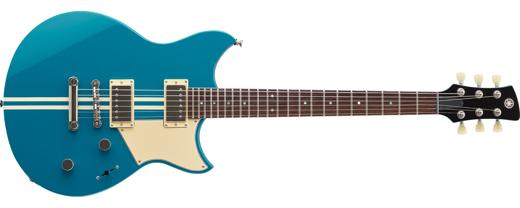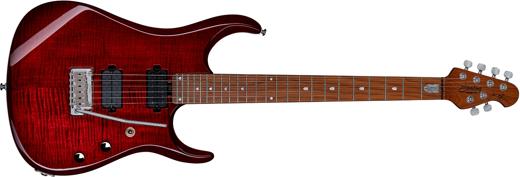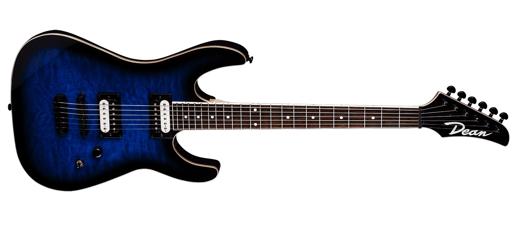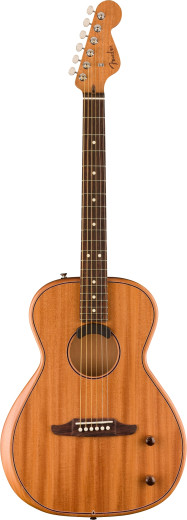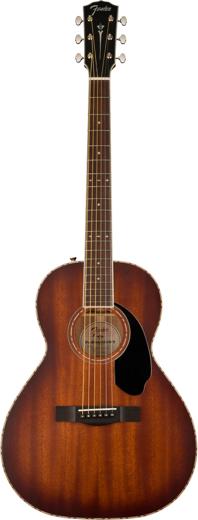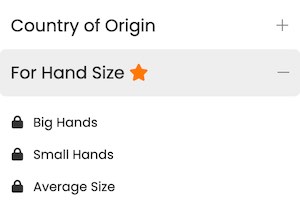Fender Highway Series Parlor Review & Prices
- From Fender's 2023 Highway series
- Made in Mexico
- 6 strings
- 24.75"'' scale
- 12" Fretboard Radius
- Mahogany top
- Chambered Mahogany back
- Chambered Mahogany sides
- Mahogany neck
- Rosewood fretboard
- Bridge pickup: Fishman Fluence Acoustic Pickup (Preamp/Active)
- Modern Viking bridge
- Acoustic C Shape Neck-Through neck
- 20 Narrow Tall frets
- Fender ClassicGear tuners
- Compare Specs >
Our Scores and Tone Evaluation
- Heavy Metal
- Hard Rock
- Jazz
- Blues
- Funk
- Country
Fender Highway Series Parlor
- Expensive Wood
- Ivory Tusq Nut
- Top Brand Pickups
- Electronics
- Ivory Tusq Saddle
- Cheap Fret Wire (NS)
- No Locking Tuners
- Made in Mexico
- Laminated Top Wood
- Laminated Side Wood
- Laminated Back Wood
- No Compound Radius Fretboard
- No 21:1 Tuner Ratio
- No Strap Lock
Price Overview
Its average competitor's price is $800, which means that the Fender Highway Series Parlor costs around 25% more than the competition. It might be due to it having additional features, but know that you can find cheaper similar alternatives. This takes into account all instruments of the same category in our database with 6 strings and Fixed bridge that are made in Mexico.
These are affiliate links. We may earn a fee if you purchase after clicking. These prices are prone to error. Make sure you're buying the right product after clicking on a link from our site. We are not liable if you buy the wrong product after following these links. As an Amazon Associate site we earn from qualifying purchases.
Videos










Your feedback
Not all instruments are created equally. That's why it's important to have different opinions. Here's what our users who have played this instrument say. If you've played it before, help others by voting below!
Weight
VoteTuning stability
VoteNeck speed (thickness)
VoteNeck access to high frets
VoteNeck profile shape
VoteFret edges
VotePickups noise
VotePickups power
VoteIs it Easy to Play?
The Fender Highway Series Parlor meets 4 out of our 8 criteria items for beginner friendliness, which means that it's not bad for beginners, but it could be better. This takes into account the type of frets, scale length, nut width, bridge type, fretboard radius, and neck profile to determine the easiest combination for new players to get used to.
New Player Friendliness
Fender Highway Series Parlor- Comfortable shape
- Easy-to-use bridge
- Tall frets
- Comfortable neck
- Comfortable fretboard
- Narrow nut
- Short scale
- Soft Strings
- Locking tuners
Hand Size Comfortability
After taking into account the neck profile, scale size, fretboard radius, and nut width, we can conclude that the Fender Highway Series Parlor's construction favors people with relatively small hands.
Nevertheless, this comes down in the end to personal preference. Make sure you test this guitar—or another one with similar characteristics—before buying.
Scale Length
Scale length is the distance the strings will span between the bridge and the nut. It can tell you a lot about the overall playability and tone of the instrument. A longer scale length means longer distance between frets, brighter tone and more string tension—which means lower action, but more difficult bending of the strings.
Here's the Fender Highway Series Parlor's 24.75" scale length compared to other common sizes:
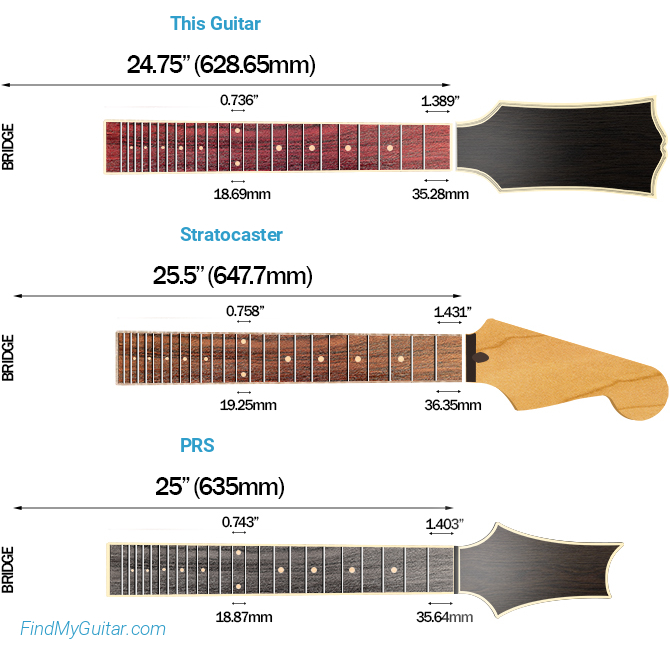
This is the scale length used in most Gibson guitars. If you like the playability of a Gibson, this guitar will feel pretty similar. It's a lot shorter than the typical Stratocaster (25.5'')
As you can see from the picture above, a shorter scale length also means shorter separation between frets. If you got really small hands, you probably will feel more comfortable playing this guitar than a Fender Stratocaster.
This scale length also allows for easier bends and vibratos because the strings will have lower tension due to the shorter scale.
Finally, another thing affected by scale length is tone. A shorter scale will give less room for the harmonics, thus resulting in a warmer, more 'bassy' tone.
Still, remember that you string gauge plays an important part in all of this. A lighter gauge will make it easier to perform bends, vibratos and will also give you a brighter tone.
Neck Profile
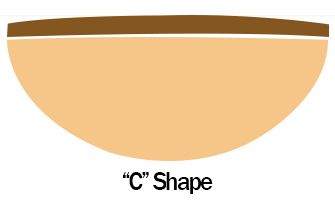
The neck profile tells you the thickness (neck depth) and shape in cross section. Every difference will completely change the feeling and comfortability of the neck. This is a highly subjective thing, but most players indeed prefer certain types of necks (like Cs and Ds) because they feel nice in most hands.
It has a C type neck. C-shaped necks like this have been the most popular for the last years. The reason is that they feel good in most hands. It's generally a thin neck that doesn't get in your way when playing fast, but that also has enough mass to give your hands a comfortable grip for chords if they aren't too big.
Thin necks like this make it easier to move your hand across the neck and it helps when playing fast solos, especially if you like to leave your thumb free while playing high on the fretboard. However, thinner necks are also weaker and will need adjustment more often than a thicker neck.
Fretboard Radius
When it comes to fingerboard radius, personal preference will dictate which one is better for you. However, most people seem to agree that a more curved (lower) radius will make it easier to play chords while a less curved (higher) radius is better for soloing and bending.
The Fender Highway Series Parlor has a 12" fingerboard radius.
Here's an image comparing this fretboard radius to other popular choices:

This is the same radius that Gibson uses in most of their guitars. When compare to the other popular radius of Fender Stratocasters, you can see that it's a lot flatter. Guitars with this radius are usually made to bring a good balance between single-note and chord playing.
Compound radius fingerboards give the best of both worlds. Unfortunately, the Fender Highway Series Parlor has the same radius across the board.
Nut Width
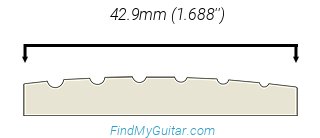
The Fender Highway Series Parlor has a nut width of 42.9mm (1.688''). This is within the most common range of nut widths for a 6-string guitar. It offers a good balance of string separation at the nut. It's the size that most guitarists prefer as it gives them just enough space to play open chords without muting the strings, but without spreading the strings too wide and making bar chords difficult to perform.
Frets
It comes with nickel silver frets, so they won't last as long as stainless steel frets. If you use your instrument a lot, you might need to replace the frets after a few years. But this is unlikely as most people change instruments before this happens.
Fret Size

Finally, let's talk about fret size. Some people prefer tall frets because it's easier to press the strings and perform bends since there's less friction against the fretboard. On the other hand, some people like shorter frets because they like to touch the fretboard when playing, or because they got heavy hands and tend to press too much on the string and alter the of the note pitch accidently.
The Fender Highway Series Parlor's frets are Narrow Tall size. These are similar to Jumbos, but they might be slightly shorter (or taller, depending on the maker), and they tend to have a narrower crown width. You'll be able to press the strings easily, but if you're not used to them, you might get the notes out of pitch if you press down too hard on the strings since their height won't let you feel the fretboard.
Playability Score
Tone Analysis
The type of wood and even the shape of the body will have a lot of influence in the final tone of an acoustic guitar. Here's we'll talk about what kind of tone you can expect from its specs.
Wood


Mahogany Top, Back, Sides and Neck: This is the type of wood found in many top-of-the-line guitars, so that's a positive point for the build quality. This red-looking wood Mahogany is found in Africa and Central America and has great sustain and a warm tone due to its high density. The downside about this type of wood is that it's relatively heavy.
Rosewood Fretboard: Since the ban of Brazillian Rosewood, this has become a rare and expensive wood. It's not usually used for guitar bodies because of this, and also because it's heavy. Instead, it's used mainly for fretboards. Sometimes it's also used for necks because it's an extremely hard wood (even harder than maple). Its tonality tends to favor warm tones.
Pickups
This guitar comes with pickups from one of the top brands: Fishman. So you can expect well built pickups with great sound that shouldn't need an upgrade anytime soon.
Sound Score
Build Quality Analysis
Country of Origin
Knowing where the instrument is produced is a good way to know how well it's built. Some manufacturing countries are known for having higher quality standards. For example, most expensive instruments are made in the US or Japan, but there are some exceptionally great countries—like South Korea—that are building a good reputation.
The Fender Highway Series Parlor is made in Mexico. This is the country that some American brands choose for building really good, but cheaper guitars. You can expect a guitar that offers a good price-quality relationship, although they don't get the same quality control as the ones built in Japan or the United States.
Bridge
Modern Viking: The advantage of fixed bridges is that they don't require any kind of set-up. This makes it extremely easy when changing strings because you don't need to adjust anything besides tuning the guitar. Also, the fact that the bridge is directly attached to the body will help to increase sustain. The disadvantage is the lack of versatility since you can't create the same vibrato effects as with tremolo bridges.
Tuners
The tuners have a ratio of 18:1. This means you need 18 turns of the tuner knob to make the tuner post go around 1 complete revolution. The more turns it takes, the finer and more precise your tuning is going to be. An 18:1 ratio is what most instruments have nowadays. Some high-end ones come with a ratio of 21:1.
Nut Material
Another important thing to analyze is the nut material, as it's one of the most important aspects that can affect the sound and playability of your guitar. A well-cut nut will make sure it stays in tune and will make it more comfortable to play.
In this case, the Fender Highway Series Parlor has a Ivory Tusq nut. This material is made to look, feel and sound like Ivory. It's made of organic polymers and doesn't contain oil or animal products. This is probably the highest quality nut you can get, so you can expect good tune stability and more clear tones when playing open strings. Most people seem to agree that it looks nicer than any plastic and even some bone nuts.
Build Quality Score
All Specs
Fender Highway Series ParlorMore Popular Comparisons With This Guitar
User Reviews
Help others by sharing your opinion about this guitar. Note: to avoid spam, your review will be submitted for approval before appearing here.
